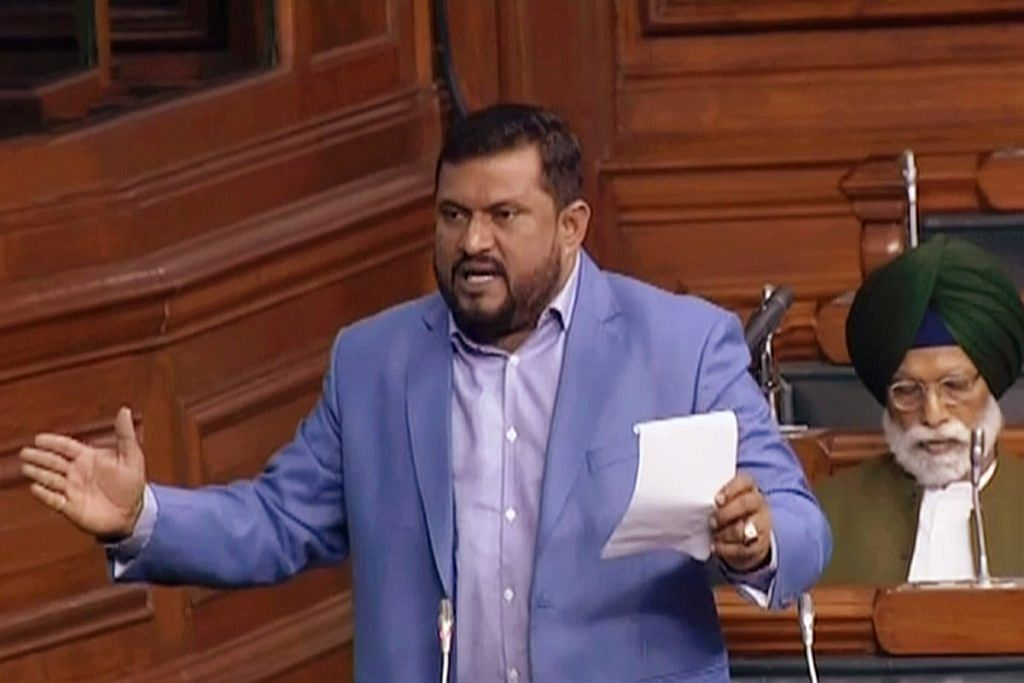New Delhi: The Supreme Court Wednesday raised doubts over the Kerala High Court’s decision to stay the conviction of Lakshadweep MP Mohammed Faizal P.P., wondering what was so exceptional about his case that led the court to interfere in such a manner.
A bench of justices K.M. Joseph and B.V. Nagarathana also observed verbally that courts cannot follow different rules for lawmakers and for non-MPs/MLAs on the issue of stay of conviction. “It (stay) cannot be run-of-the-mill, it must be in exceptional circumstances,” the court said.
The court’s remarks came while it was hearing the Lakshadweep administration’s appeal against a 25 January Kerala High Court order that suspended and stayed the conviction and sentence of 4 persons, including NCP member Mohammed Faizal, in an attempt-to-murder case.
Faizal and 3 others were earlier declared guilty for attempting to murder Padanath Salih, the son-in-law of former Union minister and Congress leader P.M. Sayeed.
On 11 January, the Kavaratti sessions court sentenced the 4 to 10 years of rigorous imprisonment. A day later, the convicts filed an appeal before the Kerala High Court and applied for bail during the pendency of the appeal.
The stay of conviction allowed Faizal, who was disqualified as a Lok Sabha MP in January, to have his membership restored. His disqualification was revoked Wednesday, just before the SC hearing.
Also Read: In Rahul Gandhi’s disqualification, Modi-Shah lay an electoral trap for Congress
Why SC objected
The SC bench took a dim view of one of the grounds on which the HC stayed the conviction. The HC had said that Faizal’s conviction would lead to his disqualification as an MP, which, in turn, would burden the exchequer.
“Prima facie, we agree that this (observation) should have been avoided,” the bench noted when additional solicitor general K.M. Natarajan highlighted that this point weighed on the mind of the HC.
The law officer emphasised that the stay of a conviction was not a rule, but an exception.
Appearing for Faizal, senior advocate Abhishek Manu Singhvi defended the HC order and explained that disqualification was one of the 5 grounds given to stay the conviction. The 4 others were in terms of the principles settled by the Supreme Court through earlier judgments, he said.
Singhvi said a court could stay the conviction when it was satisfied that failure to do so would lead to irreversible consequences. “The court is duty-bound to look into all aspects. The HC considered all 4 issues, the one regarding disqualification is an added point of consideration,” the senior counsel added.
He touched upon the merits of the case and said that, even according to the findings of the trial court, the alleged injury was not grievous as it was not caused due to sharp weapons or an iron rod, as alleged in the FIR. Singhvi claimed there were statements of witnesses to this effect as well.
But the SC bench appeared to hold a divergent view on the nature of injury on the victim, and felt it was not right for the HC to have opined that the victim had sustained a simple injury.
“If the man was not taken to the hospital, he could have died. He was airlifted in a helicopter and kept in ICU for close to 2 weeks,” said Justice Joseph.
Singhvi interjected to say that the doctor’s report prepared after the victim’s admission to hospital noted that he was conscious. Hence, the HC’s prima facie finding that the victim had suffered a simple injury was correct.
However, Justice Nagarathana said that a conviction could be stayed if the court was of a prima facie opinion that the case is of acquittal. She asked Singhvi about the irreversible consequences, which the HC considered, in case the conviction was not stayed, adding that the rule for a stay has to be the same for MPs/MLAs and other citizens.
Singhvi said disqualification was not just vis-à-vis a parliamentarian, but others as well. He cited the example of a government servant who could face disqualification from work in the event of a conviction. “Disqualification can be in many situations and not just of an MP or MLA,” he added.
The bench finally asked Natarajan to produce statements of all relevant witnesses before the court so that it can peruse them. While giving them 10 days to do so, the court fixed 24 April to hear the matter again.
(Edited by Sunanda Ranjan)
Also Read: Rahul Gandhi disqualification: What are the grounds for expelling lawmakers & what laws say
